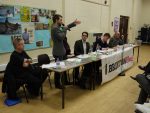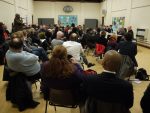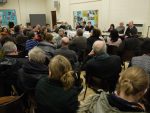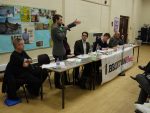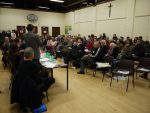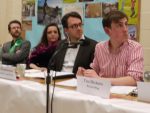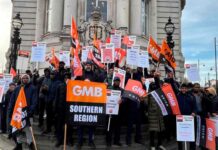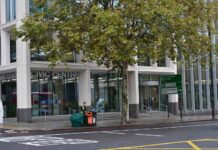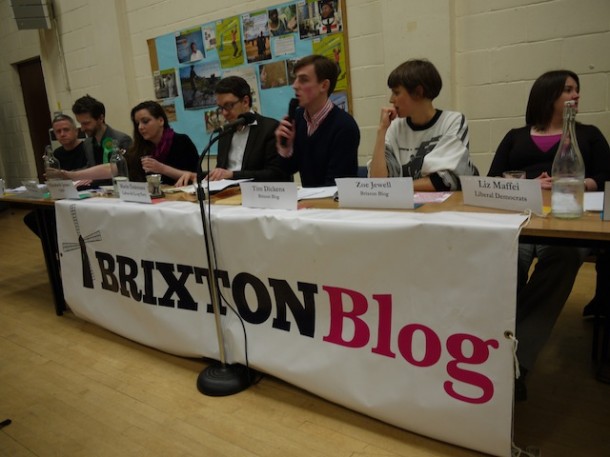
Last week the seven candidates standing for election as a councillor in Brixton Hill were grilled by the public about what they would do if they won in the ward by-election on Thursday (January 17).
Before they sat down at the hustings, Brixton Blog grilled each wannabe councillor about employment problems in the ward, here’s the video.
During an evening of often-heated debate they covered the big issues, including schools, transport, housing and the council’s drastic spending cuts. The Blog’s political editor, Kaye Wiggins, was there to summarise their hopefuls’ wider ranging views:
On spending cuts
Steve Nally, the Trade Union and Socialist Coalition candidate, said he was standing to campaign against austerity and cuts.
“If I’m elected I’ll immediately convene a Lambeth anti-austerity forum involving all the community campaigns in this borough, so we can start a movement like in the 1980s against those councillors who’ve made cuts in jobs and services,” he said.
Nally also criticised Labour councillors for claiming they were making “tough decisions” by cutting services. He said: “The tough decision would be to stop the cuts… A Labour councillor will vote for cuts, as sure as night follows day.”
Green Party candidate Andrew Child said he wanted to work with Lambeth SOS, the campaign group fighting to save services such as libraries and children’s centres.
Martin Tiedemann, Labour’s candidate, said he would resist “unnecessary cuts to frontline services”, but would be “prepared to make tough decisions where needed.”
He said: “The options are that we could make every cut necessary regardless of its effect on communities, or we could abdicate responsibility by not making decisions, then [government minister] Eric Pickles will make those decisions for us, or we can make tough decisions together with our communities.”
Tiedemann said he wanted to resist cuts, but in reality the council had lost a third of its budget.
Socialist candidate Danny Lambert had a more radical suggestion: “In times of recession public services are the first thing that gets cut. This is the nature of capitalism and it’s time to wake up. We’re in a society that doesn’t work in our interests. There’s nothing we can do about it unless we dump the capitalist system.”
He added: “Capitalism is pernicious, sordid and disgusting and it needs to go in the dustbin of history.”
Tim Briggs, the Conservative candidate, said: “It’s a difficult one this, being a Conservative. I think budgets have to be balanced to work effectively and that’s the reality…What do you do about the cuts – well, you’ve just got to grin and bear them, I’m afraid. Everyone is taking their fair share.”
Liberal Democrat candidate Liz Maffei said she supported Keynesian economic principles, which would involve spending more to fight the recession, but she added that the Liberal Democrats at a national level couldn’t do this because they were the junior partner in the coalition. “We need to wait for the economy nationally to recover,” she said.
UKIP’s Elizabeth Jones said her party would cut Britain’s spending on Europe to save money.
On local business and the campaign to save the George IV pub
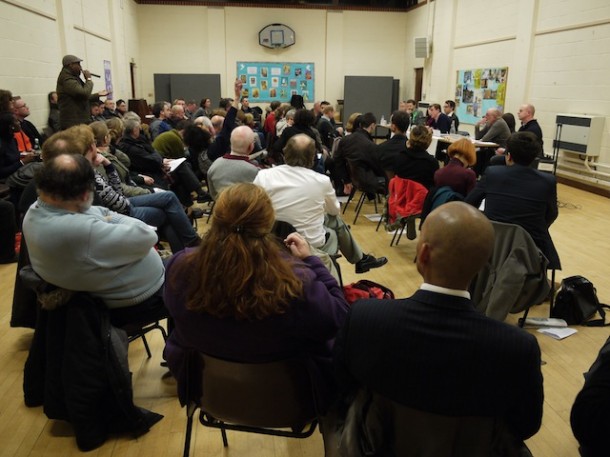
Andrew Child told residents: “I pledge to save the George IV pub from Tesco. I’m going to see that through. Local businesses keep money in the local economy. Tesco does not do that – it’s here today, gone tomorrow.” He said he also supported the Brixton Pound and would support market traders against “20% rent hikes by greedy landlords”.
Martin Tiedemann said he would support the campaign to save the pub. “What we need is a pub that’s viable,” he said. “We need a plan for the whole area. I support cooperatives and I’ll be there in that pub, supporting it.”
Tim Briggs said the source of the problem was the council’s planning process. “People didn’t know about it [the sale of the site to Tesco] until it was too late,” he said. “How is the community properly represented during the planning process? People need to know about it earlier.”
Danny Lambert said the pub’s closure was one of many symptoms of capitalist economics. “If this pub can’t be run at a profit it’ll get closed down and something else will open that can,” he said. “People come a poor second to profit. Until we get shot of capitalism we’ll have this problem over and over again.”
On transport and traffic
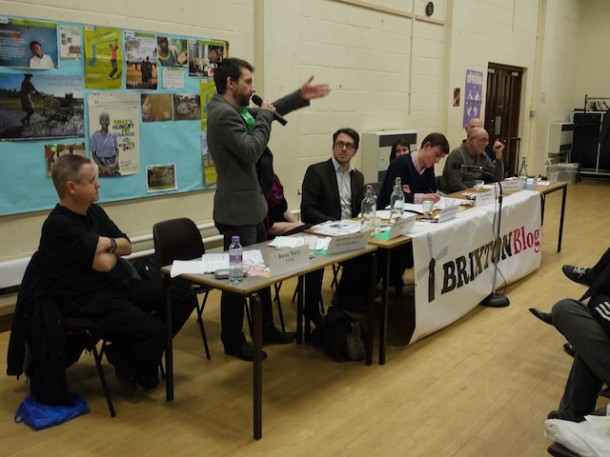
Andrew Child accused Lambeth council of “redefining” potholes in order to avoid having to fix them. “I broke my elbow on one of them, when I came off my bike,” he said.
Martin Tiedemann said one of his main priorities was to reduce speeds on residential roads, using 20mph zones. He said Brixton’s junctions had to be made safer for pedestrians and cyclists.
Elizabeth Jones said parking charges should be cut, to encourage people to shop locally, adding that speed bumps should be removed. She also said UKIP would introduce a tax on “foreign lorries coming into the UK.” She added: Foreign lorries can go down the British road, damage it, whatever, completely free.”
Tim Briggs pointed out that it was a Conservative mayor who introduced Boris bikes and has extended cycling lanes – but was heckled by audience members who said cycle hire had been started by Labour mayor Ken Livingstone.
Asked whether she would support Brixton Hill becoming a no drive-through zone, Liz Maffei said she wouldn’t, but that the community’s concerns had to be listened to.
Danny Lambert said it was clear that “pedestrians, cyclists and motorists don’t mix.” He said: “Somehow we’re still talking about this in 2013. You would’ve thought our safety would be more a priority.”
On schools
Tim Briggs said Brixton Hill was not a rich ward, and was “not a ward people say they want to live in because the schools are great.” He was heckled from the audience for saying the area was an “aspiration free zone,” and that education was the only way to improve it. He said he supported academy schools because they were “run by teachers and headteachers, not local authorities who don’t know what they’re doing.”
Martin Tiedemann, however, painted a different picture of the area. “When Labour took over Lambeth in 2006, think of what the reputation of Lambeth schools were. People were sending their kids to other boroughs because they didn’t want them at Lambeth schools. Now they’re 8th best in the country.” He said he supported community schools run with a “cooperative trust” model, but added that he was “not about promoting academies.”
Elizabeth Jones said UKIP supported a return to the grammar school system.
Steve Nally pledged to fight to bring back all the youth services that had been cut.
Andrew Child said he didn’t support academies and free schools. “To be honest, it’s private education on the cheap, its those pointy little elbows,” he said.
On housing
Tim Briggs said Labour was planning to close sheltered accommodation. “We’d oppose that”, he said. “There are a lot of vulnerable people there.”
Steve Nally said his “number one priority” would be to defend people who faced eviction because of the government’s changes to housing benefit.
Andrew Child said the area needed “a new era of social housing”. He said he was supporting the residents of Cressingham Gardens, a Tulse Hill estate whose residents are fighting a plan by the council to demolish and redevelop it. “It makes more sense to refurbish than to knock it down,” he said.
Martin Tiedemann said the council had to build more social housing, adding that it was also necessary to demolish some social housing and replace it.
Tim Briggs said: “Generally the services provided for people in social housing are appalling because there’s no-one standing up for them.”
On Lambeth council’s spending
Liz Maffei said the council had £187m in reserves. “That’s money that should have been spent supporting local services”, she said. “This isn’t the time to be squirrelling away reserves.” She also said the council was planning to spend £30m on a new town hall. “It really seems like the wrong time to be doing that,” she said.
Tim Briggs said the council should track down £51m of uncollected council tax. He also said it they spent £1,000 a day on contractors brought in as consultants. “That’s footballers’ wages,” he said.
Elizabeth Jones said she did not want to be a financial burden on residents, so she would not accept a pension scheme for councillors, funded with taxpayers’ money. She also criticised the council forgiving its chief executive Derrick Anderson a £193,000 salary. “For goodness sake, he’s not an atomic physicist,” she said. “How does he justify that? I really don’t know.” She also accused the council of wasting £80,000 per year on the Lambeth Talk magazine.
Andrew Child said it was wrong for Lambeth to have spent taxpayers’ money on political advertising.


